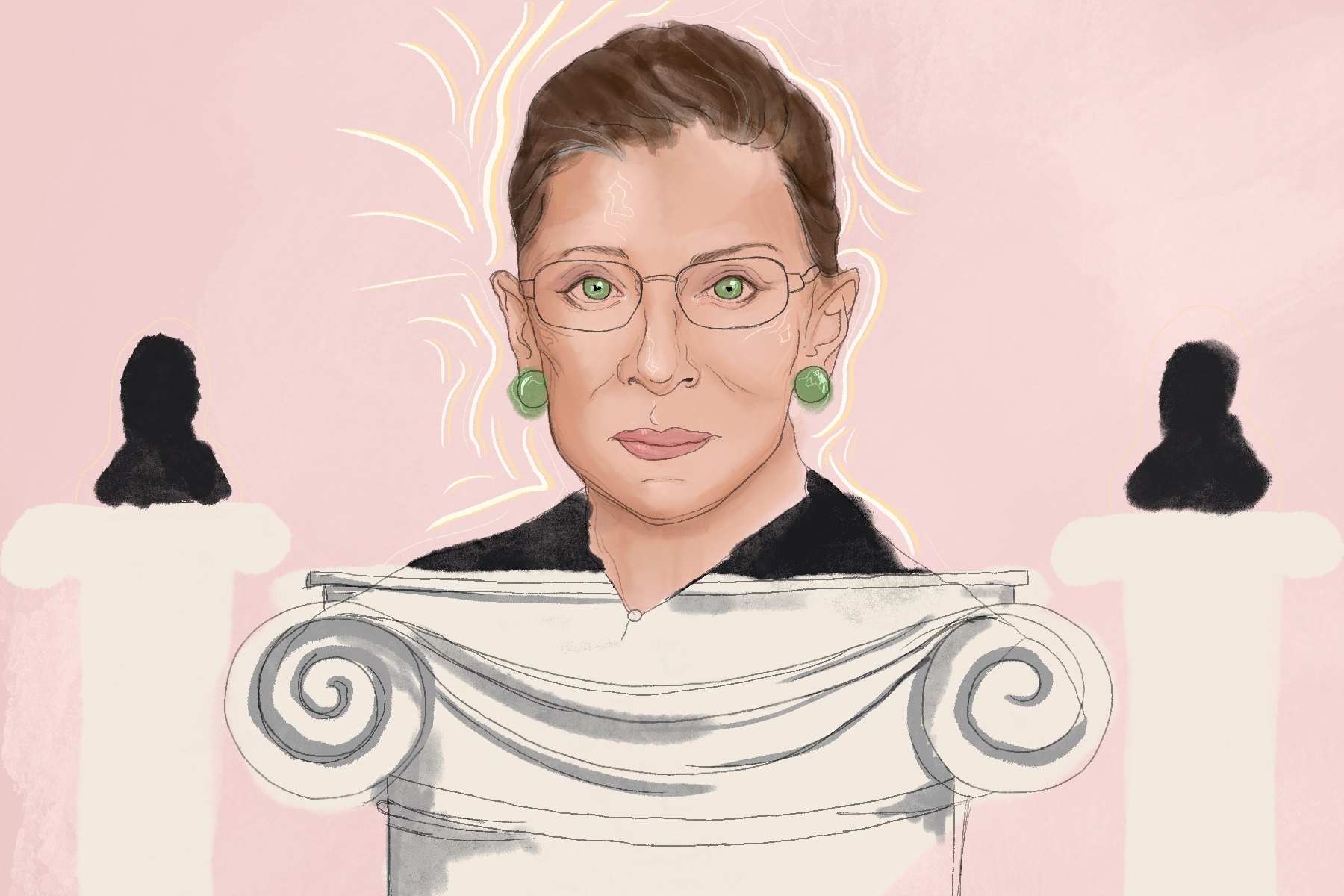The death of Supreme Court Justice Ruth Bader Ginsburg on Sept. 18, 2020, rocked the entire nation as millions of people publicly mourned her passing. Hailed as a “hero,” a “feminist icon” and a “dissenter,” Ginsburg and her legacy have become a grandiose representation of gender egalitarianism to liberals and even conservatives. RBG’s likeness has even become a popular commercial commodity, with T-shirts, mugs and a blockbuster movie.
As time progresses further from her passing, her image as a pop culture symbol and her nickname as “Notorious RBG” — which emerged after Shana Knizhnik, a Tumblr blogger, bestowed on her the title as a pun on Biggie Smalls’ stage name Notorious B.I.G. — become further cemented into American history. This glorification of Ginsburg is evident across social media as celebrities, influencers and the mass public memorialize her in an extreme manner.
This reverence represents a much larger cultural obsession in American society, which consistently likens politicians to celebrities. The idolization of political figures often decreases the likelihood of the figure being held to rigorous moral standards.
Although Ginsburg should not be revered as the ultimate symbol of gender equality, I will not deny that she had a formidable career tackling gender inequality, gender discrimination laws and other progressive issues. Her dissent in landmark cases such as Bush v. Gore (2000) and Ledbetter v. Goodyear Tire & Rubber (2007) were momentous — the latter even leading to former president Barack Obama’s first act in office, the Lily Ledbetter Fair Pay Act of 2009, which allowed Americans to effectively challenge unequal pay.
While Ginsburg’s progressive comments, decisions, dissents and majority opinions have been celebrated in the aftermath of her passing, her supporters have expressed a firm disapproval for those who try to hold Ginsburg accountable for racially insensitive comments and anti-indigenous and anti-prisoner court decisions.
In Porter v. Nussle (2002), Ronald Nussle, a prisoner at a correctional institution in Connecticut, asserted that correctional officers had violated the Eighth Amendment by “subject[ing] him to a sustained pattern of harassment and intimidation.” All Supreme court justices — including Ginsburg — dismissed Nussle’s case due to a literal interpretation of the Prison Litigation Reform Act of 1995 and previous Court precedents. Writing for the unanimous opinion, Ginsburg maintained that the PLRA requires that prisoners must exhaust all administrative remedies in all situations before going to court, which would effectively construct more obstacles for wrongfully treated prisoners to charge their assailants.
Ginsburg has also rightfully received backlash for her comments on Colin Kaepernick’s decision to take a knee during the National Anthem in protest of systemic racism. When asked about the protest, RBG described his actions as “dumb and disrespectful.” She continued to insult the decision of Kaepernick and other kneeling athletes, saying “If they want to be stupid, there’s no law that should be preventive. If they want to be arrogant, there’s no law that prevents them from that. What I would do is strongly take issue with the point of view that they are expressing when they do that.” Due to the backlash, Ginsburg apologized and regarded her own comments as dismissive. However, it is also worthy to note that she had only hired one Black law clerk since 1993.
Ginsburg’s lack of advocacy for the American Indigenous population has also been criticized after her support for overturning a lower court ruling that would have blocked the U.S. Forest Service from issuing a permit to allow a pipeline to cross under the Appalachian Trail. She voted against the Oneida Indian Nation of New York, who sought to obtain sovereignty against the City of Sherrill in Sherrill v. Oneida Indian Nation (2005). After members of the tribe began to buy back pieces of tribal land that were once sold by their predecessors, the City of Sherrill argued that the land was not tax-exempt, as it was no longer considered to be protected under reservation status. Delivering the majority opinion of the court, Ginsburg wrote that the Court held that the standards of federal Indian law and federal equity precluded the tribe from unilaterally reviving its ancient sovereignty.
The Problematic Nature of Idolizing Ginsburg & Other Political Figures
Listing Ginsburg’s flawed comments and decisions was not intended to portray Ginsburg as a “monster,” but rather to invite a conversation on how politicians are not meant to become idols in the eyes of the public.
Nonetheless, there are still many RBG supporters who would argue that Ginsburg’s support of these decisions was primarily due to Supreme Court precedent and the judge’s obligation to support constitutional decisions that they may not morally agree with. One can debate that perhaps it was not the personal fault of Ginsburg at all, but rather of the broken judicial system that has caused such unpopular court precedents. It is quite evident that her progressive nature had been restrained and moderated in order to fit a “nonideological” agenda on the court bench. However, it is important to note that Ginsburg had willingly chosen to participate and become complicit in the harmful decisions in an unethical judicial system that hurt Black, Indigenous and other people of color. Absolving Ginsburg of guilt would be a direct silencing of BIPOC who seek to hold her and her legacy accountable.
The idolization of politicians is not unique to RBG, and has raged across modern history. Political figures such as Barack Obama, Ronald Reagan and even George W. Bush (in contemporary comparisons to Trump) are heavily romanticized and treated as larger than life figures. Obama’s drone strikes, Reagan’s dismissal of the AIDS crisis and Bush’s unethical invasion of Iraq and Afghanistan are seemingly swept under the rug by supporters who argue that they were simply working in the circumstances they were given, and that their legacies must not be tainted by mistakes. However, decisions that harm the most vulnerable people in America and in the Global South should not be minimized to “mistakes.”
I do not intend to discourage one’s personal support of RBG or any other political figure either. I too have politicians that I consistently root for and support.
However, I continuously try to ensure that I do not create any emotional attachment to any of them; these attachments are generally inappropriate, causing unnecessary stress when criticism of that figure becomes needful. These attachments do not have any place in a democratic system that requires citizens to criticize politicians until they improve as public servants. One must distance themselves from political figures, who are meant to simply represent and serve the public. Judicial servants, in particular, are intended to be much further outside of public perception to prevent partisan politics and public opinion from interfering with their decisions.
Ginsburg should not be treated as a celebrity because she simply is not one. She is a political figure who had the ability to influence and interpret law in ways that celebrities, who are meant to entertain, cannot.
Therefore, if one wants to celebrate Ginsburg’s commitment to gender equality or voting rights, that person has every right to do so, but must remember Ginsburg is not immune to criticism. One must continue to fight for vulnerable marginalized communities, and hold any and every political figure accountable if they have chosen to not do so.


















It’s a good article!
A thoughtful, well-balanced analysis that is both complimentary and critical! @retro bowl
Thank you for sharing such a helpful post!. @geometry dash
I appreciate you sharing your perspective on this important @crossy road